Global Warming

The findings directly contradict the Trump administration's policies on climate change. The Environmental Protection Agency has removed mentions of climate change from their website, with administrator Scott Pruitt denying that carbon dioxide is a primary contributor to global warming. "It begs the question, where are members of the administration getting their information from? They’re obviously not getting it from their own scientists," Philip B. Duffy, president of the Woods Hole Research Center, said.

More than 97 percent of climate scientists agree that human-caused climate change is happening here and now. Yet many Americans are unaware of this scientific consensus.
Meanwhile, evidence of climate change is mounting—rising seas, retreating glaciers, and extreme weather—as are their effects on human health and well-being, everything from more lung disease and vector-borne illnesses to injuries and deaths from extreme weather events.
In the face of these sobering realities, the Trump administration is taking steps to reverse progress the U.S. has made on carbon pollution by eliminating the Clean Power Plan, radically shrinking the Environmental Protection Agency, reversing environmental safety regulations, and potentially withdrawing from the Paris climate agreement.
However, we are not helpless, and the situation is not hopeless. In many ways, the prospects for progress in combating climate change are good. The costs of clean, renewable energy, such as solar and wind, are dropping precipitously, and a large majority of Americans want us to transition quickly away from fossil fuels, regulate carbon emissions, and abide by the climate agreement reached in Paris last year. National environmental organizations are seeing rapid increases in donations and volunteerism from those who oppose federal efforts to dismantle environmental protections. But it’s not enough.
Building a strong national movement to protect the climate requires many voices. The voices of Christians are especially needed. And many are speaking up. “The poor, the disenfranchised, those already living on the edge, and those who contributed least to this problem are also those at greatest risk to be harmed by it. That’s not a scientific issue; that’s a moral issue,” wrote Katharine Hayhoe, a renowned climate scientist and evangelical Christian, on The Conversation website. She has noted that, “As scientists we don’t know a lot about suffering, but as Christians we do. And we know that part of the reason we’re here in this world is to help people who are suffering.” Pope Francis has made the case that climate change is one of the principal challenges facing humanity and that it is a moral imperative for Christians to rise to the challenge.

The years ahead of us will be the most challenging our species has ever faced. For many of the other species that share this planet with us — and for some of our own people — it will be too much to survive. Dressing for a funeral doesn’t begin to prepare our hearts for this kind of devastation.
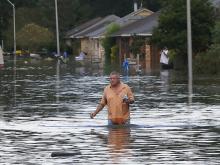
No matter where we are, the climate crisis is not far from home.
For some time it has largely been the world’s most vulnerable, in the global south, bearing the brunt of suffering and climate-induced devastation. Those who have the power to change things have so far all but ignored “the cry of the poor and the cry of the earth,” as Pope Francis wrote in his encyclical a little over a year ago.
But just this past month in the United States — one of the world’s wealthiest nations — we have seen historic droughts, unprecedented floods in Louisiana, and wildfires in California, killing many and displacing tens of thousands.
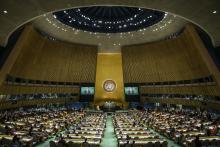
The Paris climate accord, negotiated in the French capital just weeks after the terrorist attack there in November, was signed April 22 in recognition of Earth Day, reports USA Today. World leaders representing 175 countries were present for the signing, along with 197 children, including John Kerry’s granddaughter, whom he held as he signed the agreement for the U.S.
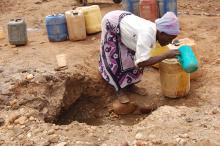
Churches in eastern and southern Africa are appealing for humanitarian aid in the region, as 36 million people grapple with the worst drought in decades. Linked to extreme El Nino weather conditions, the drought has hit countries such as Somalia, Ethiopia, Kenya, South Sudan, Malawi, and Zimbabwe, among others. The conditions have reversed normal weather patterns, upsetting people’s livelihoods.
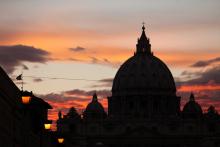
On July 21 and 22, the Vatican hosts two conferences on human trafficking and climate change, bringing the mayors of major cities — including several in the U.S. — to Rome for the events. What do human trafficking and climate change have to do with each other? And what does Catholicism have to do with them? Let us explain.
Q: Why is the Vatican concerned with human trafficking and climate change?
A: If Pope Francis has two pet issues, they are human trafficking and climate change. Since the first year of his papacy he has spoken against human trafficking, calling it “a crime against humanity” and lamenting it as modern slavery. It’s an even bet that when the pope addresses the United Nations in late September he will hammer it as one of the crucial issues of our time. Ditto on climate change. In June, the pontiff published his encyclical — the highest teaching of the church — on climate change.
“Our home is being ruined and that hurts everyone, especially the poorest among us,” Francis said just before the publication of the encyclical.
1. I Went to Church with Bruce Jenner, and Here’s What Caitlyn Taught Me About Jesus
“Caitlyn knows who Jesus is, and Jesus knows her by name. Whether that sits comfortably on a timeline or blog comment, I know firsthand that Caitlyn has heard the good news. And, Caitlyn has taught me more about Jesus.”
2. And the Award for Trailblazing Feminist Icon Goes to — Miss Piggy
The Sackler Center for Feminist Art awarded the Muppet with its First Award, which recognizes women for being first in their fields and has included the likes of Sandra Day O’Connor, because the character has “qualities that … women need to have to face the world as it is, and she gives us a good smile on top of it all.”
3. In Baltimore Schools, Free Meals for All
"Given the socio-economic status of the city, it's a no-brainer," [parent David T.] Clements said of the program. "Parents can now take that money and apply it to their futures."
4. Study Finds Global Warming Hasn’t Slowed
The latest study, published in Science, reverses previously held thought that global warming was on hiatus. Not so, according to the numbers, which were based on what the scientists say is more accurate land and sea temperature measurements.
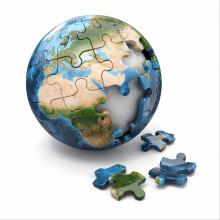
There could not be a more important year for climate action. It’s now or never. The future of our planet and the people, places, and things that we love depend on all of us working together to demand a healthy, just, and vibrant planet home. It impacts everything else – immigration and migration due to drought, flooding, sea level rise, and worsening storms; war and conflict over natural resources; access to drinkable water; food insecurity, hunger, and agriculture; disaster relief. It even impacts the sex trade — when women have to walk farther and farther to find water, they’re more vulnerable to rape and kidnapping in many regions.
So here we are, now. Governments, scientists, universities, companies, our military, and thousands of non-profit organizations are all scrambling to save the very integrity of God’s creation, the composition of the atmosphere God so magnificently created to support life on earth. And Christians are barely even at the table. We need to be at the table.
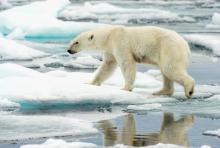
Most Americans say they feel a deep connection to the wider world.
But all that spiritual stargazing makes no difference in views about the facts of climate change and global warming, a new survey finds.
Just 5 percent of Americans thought climate change was the most important issue in the U.S. today. And religion was a major dividing point on how much — or how little — they think it’s a matter of concern, according to a new survey by the Public Religion Research Institute.
“We asked about spiritual measures such as being in awe of the universe, and you might think it would correlate with views about the universe. But, in fact, they have very little relationship,” said Robert Jones, CEO of PRRI, which conducted the survey on U.S. adults’ attitudes toward climate change, environmental policy and science.

Worried about global warming, a growing number of churches and other faith groups are divesting their holdings in fossil fuel companies, which release large amounts of carbon dioxide and other greenhouse gases into the atmosphere.
“The warning in Scripture that ‘the wages of sin is death’ could not be more literally true than it is in the case of fossil fuels,” said Serene Jones, president of New York’s Union Theological Seminary, whose board voted in June to divest its $108.4 million endowment from fossil fuel companies.
“While we realize that our endowment alone will hardly cause the fossil fuel giants to miss even half a heartbeat, as a seminary dedicated to social justice we have a critical call to live out our values in the world. Climate change poses a catastrophic threat, and as stewards of God’s creation we simply must act.”
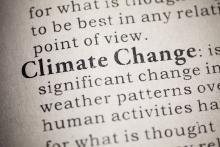
BAN KI MOON has summoned the world's leaders to New York in September to talk about the climate—and in the process he's also summoned all of us who care about the planet's future. We'll be there in record numbers, for the largest demonstrations about global warming yet—and there will be, I think, an unavoidable edge of anger. Because calling these guys "leaders," at least on this issue, is by now a joke.
Take President Barack Obama, for instance. He ran for office promising, in almost biblical terms, that during his administration "the rise of the oceans would begin to slow." Installed in office, he summoned environmentalists to the White House where his staff informed them that he wouldn't be talking about climate change: "Green jobs" tested better in focus groups.
And President Obama was true to his word. He hardly ever talked about climate change: He summoned no political muscle to back attempts at a climate bill in the Senate, and he watched as the Copenhagen climate talks collapsed, the biggest foreign policy failure in many years.
When Obama run for president in 2012, he made it through the whole campaign—during the hottest year in U.S. history—without even mentioning global warming. And while he delayed half of the Keystone pipeline, he "expedited" approval of the southern section, boasting that his administration had built enough new pipelines to wrap around the equator. He has modest decreases in carbon emissions to herald—and massive increases in oil and gas drilling. On his watch the United States will pass Russia and Saudi Arabia as a hydrocarbon source.
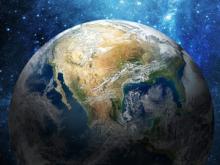
The accelerated pace of climate change deterioration in recent decades is highlighted in the report by the Intergovernmental Panel on Climate Change that was released in December 2013. This report highlights the alarming rates of carbon emissions in recent years and the massive disruptions to the nature that occur as a result. It warns that the disruptions could affect all areas of life and endanger the world’s food supply itself. The worst is yet to come. All this might sound a bit apocalyptic.
Acts 2:14-32 posits a similar scenario. Luke’s Peter predicts the signs that will occur in the last days (vv. 19-20). The Sun will turn into darkness and the moon into blood. There will be blood and fire and smoky mist. Joel 3, Luke’s source text behind these verses, was intended as a warning about potential disturbances in the natural order. Joel posits such calamities as consequences of human wickedness and calls on the people to alter their ways. Peter warns that such last days are about to arrive. They will be marked by disturbances in the natural order and terrible signs that will precede the day of the Lord. Interestingly, people in Jerusalem have already witnessed such (un)natural phenomena during the death of Jesus (Luke 23:44-45).
Acts 2 parallels the account of disruptions in the nature with the account about the death of Jesus (2:19-24).

WITH THE HEAT of mid-year finally over—judging by the fact that Dallas has settled into a sweater-friendly 97 degrees—it’s time to look back and see what we’ve learned from another summer filled with unpredictable weather extremes.
For example, a couple weeks in August were actually extremely comfortable, which was no help to my crusade to convince Fox-loving friends that the earth is warming. Lately, even scientists have been of little use, adamantly refusing to blame rampant forest fires and extreme droughts on climate change. They insist on “analyzing” patterns of weather “over time” to honor “standards of science.” There’s nothing worse than climatologists dragging their feet when there are righteous accusations to be flung. Global warming is behind EVERYTHING wrong! You know it. I know it.
Okay, sorry.
But this summer had way too many examples of the extreme consequences of climate change, including deadly tornadoes, inundating floods, and town hall meetings that brought forth a storm of discontent. Unsuspecting members of Congress had left the comforting gridlock of Washington, D.C., and, failing to first check for a full moon, had innocently invited questions from constituents in their home districts. This is almost always a mistake. You really need to test the water before you just walk into a home district unprepared.
Expressing her opinion that climate change is no longer about energy efficient behavior but rather about national policy, spiritual leader Marilyn Sewell argues the importance of what it takes to preserve the Earth’s atmosphere. Expressing her concerns about the lack of community and church involvement, Sewell insists policy immersion is crucial toward resolving future matters surrounding climate change. The Huffington Post reports:
So where is the parish church in all of this? Mostly silent, it seems. Churches continue to be concerned with individual sin as opposed to systemic sin, even in regard to climate change. Congregants may be admonished to recycle and change their light bulbs, but not to become politically active. The fact is we're way beyond changing our light bulbs. We need to bring that unhappy, startling truth to the pulpits of our land.
Read more here.
With hopes to reduce mass amounts of pollution, President Obama has begun forming a list of ideas to condense the amount of carbon dioxide entering earth’s atmosphere. He plans to act quickly as such a process could take years to accomplish. The New York Times reports:
The administration has already begun steps to restrict climate-altering emissions from any newly built power plants, but imposing carbon standards on the existing utility fleet would be vastly more costly and contentious.
Read more here.
Thomas Tidwell, the chief of the United States Forest Service, told Congress hotter, dried conditions produced by climate change are causing America's longer wildfire season and increasing the amount of land burned. Since 2000, the forest service has almost doubled its spending on fighting fires from $540 million to $1 billion last year. The Guardian reports:
"Hotter, drier, a longer fire season, and lot more homes that we have to deal with," Tidwell told the Guardian following his appearance. "We are going to continue to have large wildfires."
Read more here.
An overwhelming 97.1 percent of peer-reviewed papers in scientific journals agree that climate change is caused by humans. This finding can be used as a rebuttal against those who believe the scientific community is still debating the causes of climate change. Public opinion is still mixed with only 42 percent agreeing that human activity is the main cause of climate change. The Guardian reports:
"Our findings prove that there is a strong scientific agreement about the cause of climate change, despite public perceptions to the contrary," said John Cook of the University of Queensland, who led the survey.
Read more here.
A study published May 1 from two researchers at the University of Pittsburgh and the University of Colorado found the widespread belief in "end-times" and the "Second coming" of Christ could impact the environmental policy movement negatively. The Huffington Post reports:
A belief in the Second Coming reduces the probability of strongly agreeing that the government should take action by more than 12 percent. In a corresponding manner, a belief in the Second Coming increases the probability of disagreeing with government action to curb global warming by more than 10 percent.
Read more here.
General Motors signed the Climate Declaration. The statement is part of a new initiative by businesses for greater action on global warming in Washignton. No specific recommendations are made in the declaration. The Guardian reports:
"We want to be a change agent in the auto industry," Mike Robinson, GM vice-president of sustainability and global regulatory affairs, said in a statement.
Other endorsers of the Climate Declaration include eBay, Ceres, Starbucks, and Unilever.
The short statement, endorsed by GM, leads off: "Tacking climate change is America's greatest economic opportunity of the 21st century (and it's simply the right thing to do)."
Read more here.